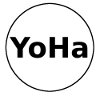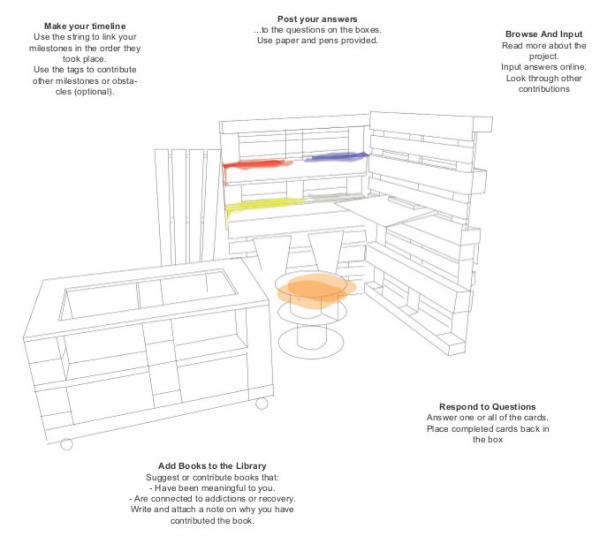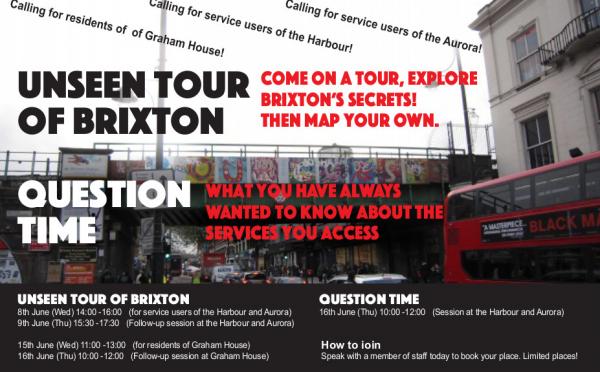
Reading Room

Notes from Critical Friends Meeting - READING ROOM
The team have tried to talk to participants about knowledge/ power and the experience of being a client/ service user. Although People who come for addiction treatment and support, accumulate a lot of knowledge in the pursuit of self care connecting this to the machinery of Governance (investigated in the first research project DA), has been difficult. The Reading Room activities have highlighted this gap between experience and knowledge from participants due to low self esteem and the difficulties of scaling in or out of one’s experience. It is clear that service users do know how databases affect them but thinking about this conceptually is too abstract. People have trouble ‘zooming out” from their everyday experience.
‘Knowledge’ is a category that is not always useful, people didn't necessarily feel they had situated knowledge so the concept of ‘learning’ helps to zoom out a bit.
Asking ‘How has your experience taught you?’ What have you learnt to do? Has proved fruitful
People have important and useful knowledge and expertise but find it hard to explain exactly how to use it. Mutual support is a theme in peer mentoring: sharing what people know by taking someone to the GP for example. JD used the metaphor of ‘ trying to explain to someone how you know how to ride a bicycle, you just know it from your own experience but it’s difficult to explain how. Another theme that is emerging is that ‘everybody’s journey of recovery is individual’.
The concept of the “Reading Room’ creates a frame that allows the ‘knowledge/power’ relationship to be interrogated in a way that people can enter, it provides a focal point where service users can contribute and reflect on material, books and objects and digital contributions, ask questions and give answers.
It will be a travelling installation that can move around and gather contributions, and in this process develop a knowledge and learning exchange. The Reading Room structures this collected knowledge. It will travel to 3 spaces in starting in January to do this: LHH, Aurora and the Harbour.
1.2 Emerging research themes
“The Unseen Tour’: the idea of seeding ideas through thinking about urban things space, for example, Thomas De Quincey’s Confessions of an English Opium Eater. There are rich histories here.

The Reading Room Research Process
There are processes happening simultaneously: Anila and Sam have been working with a group on the build at the Remakery (a local, community recycle space, which has been a great find). Jean is working with a group on content and ‘meta content’ for the Reading Room i.e. creation of ‘template’ so that other people could then make their own as the room is toured.
Regular contact has been with the groups at the Aurora, and at present there are 6- 7 regulars coming along the build sessions also from the Harbour and Inma’s group. These two ways of working (engagement) mean that people can get involved in the level that suits them.
Useful approaches to investigation and creating Meta content ( the template ) include mapping, for example asking where can you go or not go anymore? People are very keen to do their own maps but the team are still thinking about what can be extracted and how to develop templates. LH pointed out that they are on a clinical journey – ‘ the clinical roadmap to recovery’ so this theme of mapping and journeys is helpful for service users. (GH gave an example from another project where people in Southend mapped their first kiss. The museum of broken relationships in Zagreb was also using mapping in ways that made the funny/ sad apparent. It was agreed that people will need some guidance here.
Creating a timeline Identifying milestones/ obstacles looking at moments of significance and points at which people which changed their direction. (These include; the first xmas not drinking, or post xmas and having to negotiate advertisements for alcohol).
Providing boxes for significant themes of losses and gains. E.g. coping with grief through drinking. And recovery means revisiting that grief and loss. This includes friends lost and gained. And adapting to these changes. This isn’t always seen.
A Book Exchange where contributors can inscribe why that book was important to them and other readers can similarly comment. Other reference books that are significant in the history of addiction will be sourced and ordered as there is a budget for books that can be included, these can also be catalogued and personal contributions, notes/reflections could be added
A.a genealogy of drugs in London so that people can think about themselves, and their struggles in a wider social and cultural context. These can be bookmarked on line too thereby provides a way of seeing what is useful, forming a fluid structure of power (?).. This understanding will all be extracted and reflected back to the clinic.
GH pointed out that in regard to books that go in the reading room, people should be made aware that there is a budget for books that can be included, these can also be catalogued and personal notes can be added into the books
A digital access point – possibly a ’Rasberry Pi’ will also form part of the Reading Room.
Emerging themes for the content
Amnesty from things you are not happy with. This is not about therapy but creating a collective resource that can be useful for others.
Theme of heightened senses. One participants gave the example of the heightened sensations that come with recovery, tasting crisps that felt extra crunchy for example. This was contrasted with the feeling of numbness that addictions can bring.
Self awareness. When starting on recovery process people are often called selfish for focusing intently on how they live and on the causes of their addiction. This selfishness (a word which is also used by the staff to describe service users) can aslso be understood as self awareness. We talked about how this is the opposite of lack of self awareness and self questioning shown by people who do not ask questions of their lives, who follow a set of guidelines and who are sure they are right.
Exploring the category of ‘ the addict’ and how to problematise this is in the art work.
DB discussed how addiction is a very personal thing, (in that it is existential) so the question of what is useful on this journey is also very personal. This individual experience is important to recognize in the context of the ways services are monitored and evaluated in terms of the hard outcomes. These ‘softer’ outcomes of self care, self esteem, self confidence where people set goals, and try to get back a sense of themselves that they have lost, is really important. PL observed that therapy is bounded in the treatment centre but it also happens in very real ways outside of this space.
JD discussed how recovery is not an absence, but also self awareness : people in recovery question and scrutinize themselves, with the aim of moving forward. In this way they do this more than ‘ordinary people’. The Reading Room can draw this out. This is captured in the expression “better than well’. emphasizing what is gained rather than merely what is avoided or abstained from.
The wider relevance of the project in regard to Databases and Governance
GH: on the Technical side there is also the development of machine learning. For example Google have now got an agreement with the NHS looking at medical records using “Deep Mind technology’ and they will get paid by results. Google will be able to make recommendation software. In ten years or so this may lead to having a recommendation agent for recovery pathways ‘ i.e. what works for you’. Anonymous. This has potential, ‘ especially for people with rare conditions for example, but at the same time can place people in a bubble. (like with other media which tells us “ If you like this, you will be like this’). So DA can make sense of these future developments. In many ways this is the link between the 2 pieces of work.
3. Ethics
Anonymity and confidentiality
LM pointed out that people will bring what they want to the process and can make choices in regard to anonymity and confidentiality. He pointed out that people those contributing it to it will bring what they chose. Some may not wish to be anonymous and may want recognition for their input. The project should recognize and honour participant’s capacity and autonomy. It was agreed that the project timeline may include stories if people wanted to include them, while respecting peoples need for anonymity. JD discussed that, in regard to ‘collecting personal stories, that the project is less concerned about the content, and more about the ‘how’: the process of involving people and providing a space where stories can be told and shared. ( this was also discussed in the last meeting).
Authorship Ownership.
The ethics of authorship was also discussed. GH explained that the project will be placed in the realm of ‘Creative Commons domain’ and the terms of this will be incorporated into the Reading Room. This addresses the authorship issue to some extent. MY explained that it is a functional thing to be used to think matters through together.
The aim of the project is to build a public so Creative Commons makes sense. It is not the case that the service users are merely the ‘artistic palate’ and that their input is incorporated into an exhibit. They have contributed to the process and this will be acknowledged in the public engagement process that will follow as the Reading Room is exhibited in partnership with the contributors and the partner organisations. Under CC’s people involved can take it where they want. YoHa’s focus is more on the things that people found useful in terms of a critique of the system (as in the first research project DA).
4. User engagement Public engagement and Launch
The relation between the Table of Tables and the Reading Room and the dialogue between the two objects was discussed. It was agreed that both art works can travel, and together, as well as texts on the process. A general rule for YoHa is as long as people let them know where it is going this is not a problem. It was agreed that it would make sense for the Reading Room to go to Aurora, the Harbor and LHH as part of the process of collecting content. There could be a conversation between the service users who have been in involved in both the build and the content generation.
It was also agreed that The Table of Tables and the Reading Room could be installed in the reception of LHH over several days and that a number of events could take place during this period. This contrast between the sense of “I can only speak for myself” which is a theme in the Reading Room” and the emphasis on clinical outcomes in the Table of Tables, is useful. When GH and LM showed the work (first research project DA) to clinical psychologists, it helped them think differently about addictions services and ask different questions. With service users this has been a process of helping people gain confidence. LM pointed out that the Reading Room works to legitimize the work of Dawn and Inma in regard to the value of non- clinical interventions as it captures the significance of this and makes it apparent.
There can also be a launch at LHH where a wider audience would be invited
LM pointed out that the new Science Gallery at Guys and St Thomas will have addiction as its opening theme of “Hooked” in 2018. Hannah Reddler is involved in this. Luke will contact her to find out whether there is a possibility of showing Database Addiction there.
It was agreed that all of these spaces, - academic, addictions service and art spaces are useful in different ways. The work accrues different types of value as it travels through them.
LM used the metaphor of ‘holding up the umbrella’ and creating a space underneath it. Art is useful in this sense, it brings the value of art and the dialogue it generates into these spaces.
GH suggested having a Critical Friends meeting video (recorded) as part of the process. And have this shown as part of the installation.
Naming
Rather than a addiction reading room or any other suffix, the term “reading room was felt to be neutral and helps to avoid any prejudgment about the work and those involved in it.
Timing
Activities with contributors will continue to the end of February and then the show/ launch in LHH will take place at the end of this process in April / early May. An exact date is to be agreed.




 bnr#95 =>
bnr#95 =>